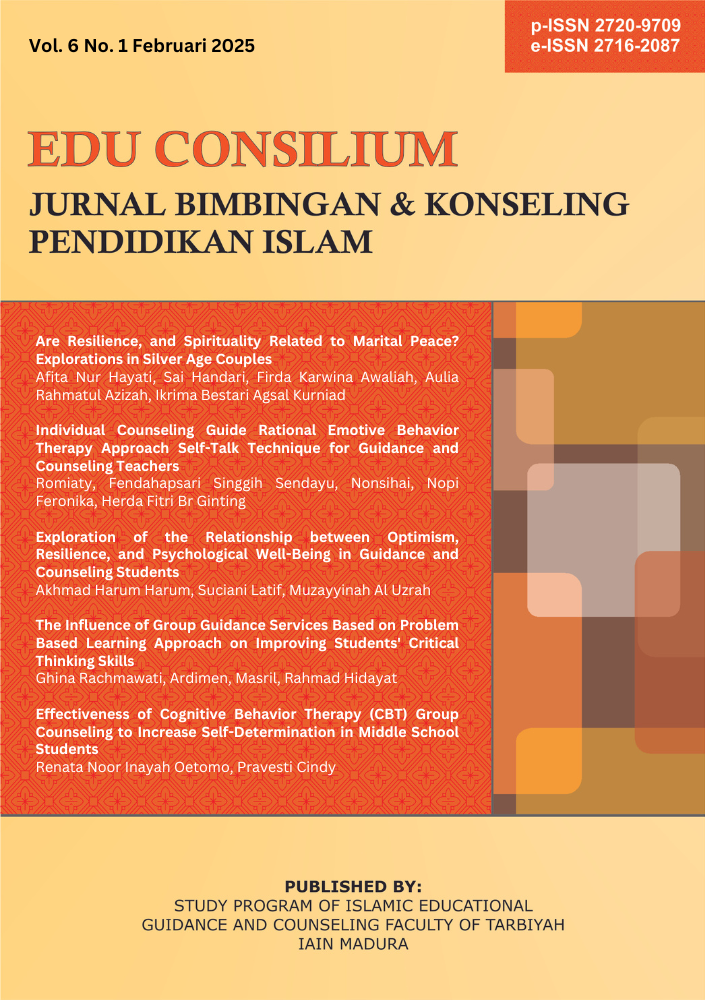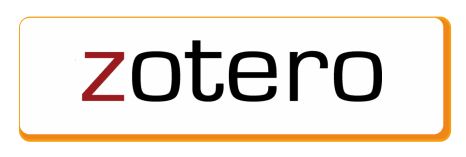The Influence of Group Guidance Services Based on Problem Based Learning Approach on Improving Students' Critical Thinking Skills
 Abstract views: 93
,
Abstract views: 93
,
 PDF downloads: 56
PDF downloads: 56
Abstract
A person's success is not only determined by their intellectual intelligence, but is also determined by their ability to think critically. Meanwhile, conditions in the field found that students had low critical thinking skills. For this reason, students' critical thinking skills need to be improved. One effort to improve critical thinking skills is through group guidance with a problem based learning approach. This type of research uses a quantitative experimental method with a one group pre-test-post-test design. The sample was determined using simple random sampling with a sample size of 10 students. The data collection technique used is a non-test technique using a Likert scale, namely a critical thinking ability scale. The research results show that group guidance with a problem based learning approach has an has a significant effect on increasing students' critical thinking skills as seen from being able to clarify, being able to make assessments, being able to make conclusions, being able to choose strategies.
Downloads
References
Abadi, P. N., Akbar, Z., & Fitri, S. (2019). Efektivitas Teknik Peta Pikiran Untuk Meningkatkan Kemampuan Berpikir Kritis. Faktor Jurnal Ilmiah Kependidikan, 6(3), 235–246. https://journal.lppmunindra.ac.id/index.php/Faktor/article/view/4347
Abduh, M. (2019). Panduan Penilaian Kinerja (Performance Assessment). Pusat Penilaian Pendidikan, 59.
Ardimen, A., Neviyarni, N., Firman, F., Gustina, G., & Karneli, Y. (2019). Model bimbingan kelompok dengan pendekatan muhasabah. Ta’dibuna: Jurnal Pendidikan Islam. https://doi.org/10.32832/tadibuna.v8i2.2232
Ardimen, A., Zahira, N., Silvianetri, S., & Hidayat, R. (2023). Efektivitas Bimbingan Kelompok Pendekatan Muhasabah dalam Meningkatkan Sikap Religius Siswa. Edu Consilium : Jurnal Bimbingan Dan Konseling Pendidikan Islam, 4(2), 1–9. https://doi.org/10.19105/ec.v4i2.10072
Fisher, A. (2011). Evaluating Inferences: Deductive Validity and Other Grounds. In Cambridge University.
Halpern, D. (2014). Thought and Knowledge An Introduction to Critical Thingking. In Paper Knowledge . Toward a Media History of Documents (Vol. 7, Issue 2).
Hamdani, M., Prayitno, B. A., Karyanto, P. (2019). Meningkatkan Kemampuan Berpikir Kritis Melalui Metode Eksperimen. Proceeding Biology Education Conference, 16(Kartimi), 139–145. https://jurnal.uns.ac.id/prosbi/article/view/38412/25445
Handaka, I. H., Setyowati, A. S., Hendarti, T., & Jaeti, N. F. (2022). The Effectiveness of Group Guidance Services to Improve Critical Thinking Skills. International Journal of Applied Guidance and Counseling, 3(1), 1–6. https://doi.org/10.26486/ijagc.v3i1.2230
Hapsyah, D. R. (2018). Peningkatan Keterampilan Berpikir Kritis Melalui Bimbingan Kelompok Teknik. Sosiodrama Peserta Didik Di Kelas VII SMP Negeri 19 Bandar Lampung Tahun Ajaran 2017/2018.
Hasanah, I., Sa'idah, I., Fakhriyani, D. V., & Aisa, A. (2022). Bimbingan Kelompok: Teori dan Praktik. Pamekasan: Duta Media Publishing
Hidayati, N. I. (2014). Pola Asuh Otoriter Orang Tua, Kecerdasan Emosi, dan Kemandirian Anak SD. Persona:Jurnal Psikologi Indonesia, 3(01). https://doi.org/10.30996/persona.v3i01.364
kuntari, M. D., Prasetiawan, H. (2023). Keefektifan Layanan Bimbingan Kelompok Dengan Teknik Problem Solving Untuk Meningkatkan Kemampuan Berpikir Kritis Siswa.
Luciana, L., Primara, R., & Prasetiawan, H. (2022). Keefektivan Layanan Bimbingan Kelompok Metode Problem Based Learning (PBL) untuk meningkatkan Motivasi Belajar Siswa pada Siswa Kelas XI SMA Negeri 1 Bantul. Prosiding Seminar Nasional Bimbingan Dan Konseling Universitas Ahmad Dahlan, 843–867.
Majdi, M. Z. Z., & Ekawati, D. (2020a). Menggunakan Bimbingan Kelompok Teknik. 1(2016), 56–63.
Majdi, M. Z. Z., & Ekawati, D. (2020b). Meningkatkan Ketrampilan Berpikir Kritis Menggunakan Bimbingan Konseling Kelompok Teknik Problem Solving Berbantuan Mind Mapping. Ghaidan: Jurnal Bimbingan Konseling Islam Dan Kemasyarakatan, 4(2), 42–47. https://doi.org/10.19109/ghaidan.v4i2.6553
Mawaridz, A. D., & Rosita, T. (2019). Bimbingan Kelompok Untuk Siswa Smp Yang Memiliki Minat Belajar Rendah. FOKUS (Kajian Bimbingan & Konseling Dalam Pendidikan), 2(4), 158. https://doi.org/10.22460/fokus.v2i4.4664
Ratna Puspita, D., & Setiawati, D. (2024). Penerapan Bimbingan Kelompok Teknik Problem Based Learning Untuk Meningkatkan Kemampuan Reaching Out Peserta Didik Di SMP Al-Falah Deltasari Sidoarjo. Jurnal BK Unesa, 14(3), 55–63.
Roziki, M. (2022). Penerapan Bimbingan Kelompok Model Problem Based Learning untuk Meningkatkan Keterampilan Berpikir Kritis Siswa SMA. Jurnal Psikoedukasi Dan Konseling, 6(1), 1. https://doi.org/10.20961/jpk.v6i1.61852
Sa’idah, I., & Annajih, M. Z. H. (2024). Konsep Dasar Bimbingan & Konseling. Pamekasan: Alifba Media.
Saputri, M. A. (2020). Penerapan Model Pembelajaran Problem Based Learning Untuk Meningkatkan Kemampuan Berfikir Kritis Siswa Kelas V Sekolah Dasar. Jurnal Pendidikan Dan Konseling (JPDK), 2(1), 92–98. https://doi.org/10.31004/jpdk.v1i2.602
Twitchell, S. (1995). The “aha!” approach or critical thinking and understanding concepts. Performance + Instruction, 34(6), 14–17. https://doi.org/10.1002/pfi.4170340606
Yunita, H., Meilanie, S. M., & Fahrurrozi, F. (2019). Meningkatkan Kemampuan Berpikir Kritis melalui Pendekatan Saintifik. Jurnal Obsesi : Jurnal Pendidikan Anak Usia Dini. https://doi.org/10.31004/obsesi.v3i2.228
The journal operates an Open Access policy under a Creative Commons Non-Commercial 4.0 International license. Authors who publish with this journal agree to the following terms:
- Authors retain copyright and grant the journal right of first publication with the work simultaneously licensed under a
 Commons Attribution-NonCommercial 4.0 International License
Commons Attribution-NonCommercial 4.0 International Licensethat allows others to share — copy and redistribute the material in any medium or format, and adapt — remix, transform, and build upon the material.
- Authors are able to enter into separate, additional contractual arrangements for the non-exclusive distribution of the journal's published version of the work (e.g., post it to an institutional repository or publish it in a book), with an acknowledgement of its initial publication in this journal.
- Authors are permitted and encouraged to post their work online (e.g., in institutional repositories or on their website) prior to and during the submission process, as it can lead to productive exchanges, as well as earlier and greater citation of published work (see The Effect of Open Access).




















